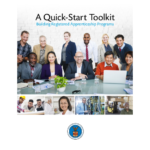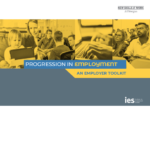Job Quality Tools Library > Section 4: Strengthening Practices to Improve Job Quality > Tools: Opportunity to Build Skills and Advance
Originally posted: May 11, 2020
Last updated: April 14, 2023
Section 4, the core of the library, includes tools designed to address specific components of job quality. Once organizations have determined their job quality priorities, they can turn to these tools to shift practices in the areas they have deemed most urgent, either in their own organizations or in the businesses with which they partner.
We’ve organized tools into categories that reflect the job quality attributes most commonly cited across the job quality frameworks and definitions included in Section 1. These attributes include wages, benefits, scheduling, legal rights, equity and inclusion, opportunity to build skills and advance, supportive work environment, worker voice, and employee ownership. Each attribute also includes sub-categories for ease of navigation.
↓ Tools and Resources Below the Box ↓
Library Navigation
- Job Quality Tools Library Homepage
- About This Library
- Section 1: Understanding Job Quality
- Section 2: Assessing Job Quality
- Section 3: Engaging Businesses on Job Quality
- Section 4: Strengthening Practices to Improve Job Quality
- Section 5: Monitoring Improvements in Job Quality
- Special: COVID-19 Response Tools and Resources
- Index of Tools by Field
Apprenticeships and On-the-Job Training

Department of Labor – A Quick-Start Toolkit – Building Registered Apprenticeship Programs
Who’s It For: Employers, Economic Development, Investing and Lending, Policy, Worker Advocacy, Workforce Development
What’s It For: This toolkit by the Department of Labor provides steps and resources to start and register an apprenticeship program. When delivered appropriately and connected to advancement opportunities, apprenticeships can strengthen job quality by increasing worker stability and mobility. This toolkit could be particularly useful for a business or labor organization, a workforce intermediary, a community-based organization, or an education institution developing an apprenticeship program.
Transparent Career Pathways

Institute for Employment Studies – Progression in Employment – An Employer Toolkit
Who’s It For: Employers, Economic Development, Investing and Lending, Worker Advocacy, Workforce Development
What’s It For: This employer toolkit is designed to engage employers in building pathways and opportunities to support career progression for workers, including by creating a supportive work environment through job redesign and supportive management. The toolkit includes information that can help employers make a business case, as well as embedded tools and case studies highlighting employer efforts. This toolkit is well suited for businesses, in particular HR professionals or other stakeholders involved in building internal career ladders. It also has applications for practitioners supporting employer practice change.
Supplemental Resources – Apprenticeships and On-the-Job Training
- The Aspen Institute Economic Opportunities Program – Unpacking the Work of Work-Based Learning. This report describes how four practitioner organizations engage with young adults and employers to design and manage work-based learning opportunities. Work-based learning can provide young adults of color an entry point into jobs in industries where they have been historically underrepresented and can provide opportunities for young adults to demonstrate their value and abilities to employers. These kinds of programs can be particularly important for young adults of color to gain the experience, education, and relationships necessary to succeed in the workforce, now and in the future. This resource may be particularly helpful to those creating or strengthening work-based learning programs and includes considerations for practitioners and public and philanthropic investors.
- JFF Center for Apprenticeship & Work-Based Learning – Making Work-Based Learning Work for Retail: A Guide for Retail Employers. This guide is designed to provide an overview of work-based learning models and guidance on implementation. Work-based learning can be valuable for career advancement if combined with supportive practices and clear directives on how skill development is related to the company’s advancement practices. This can be a helpful resource for employers as well as practitioners and educators to discuss work-based learning with a business audience.
- COWS – Manufacturing Pathways in Milwaukee: Bringing Skills and Equity to Manufacturing’s Future. This case study of a company in Milwaukee is part of an Equity in Apprenticeship series highlighting programs that use apprenticeship to extend career opportunities to historically marginalized groups. Employers and practitioners can glean lessons related to achieving equitable outcomes through apprenticeship programs.
Supplemental Resources – Transparent Career Pathways
- The Aspen Institute Economic Opportunities Program – Goodwill San Diego Profile. This report shares how Goodwill San Diego adapted its culture and operations to enhance job quality and business performance in response to a mandated local minimum wage increase, including by developing transparent career pathways, investing in leadership development at all levels, and building a culture of learning and development. Businesses and service providers seeking to get ahead of minimum wage legislation and improve job quality can learn from the practices outlined in this profile.
- Building Movement Project – Working at the Intersections: LGBTQ Nonprofit Staff and the Racial Leadership Gap. This research examines the experiences of LGBTQ staff of color in nonprofit organizations, who report structural barriers that limit access and opportunity to advance to leadership positions. The report describes the compounding effects of race and sexuality on career advancement for LGBTQ people of color and highlights the role of bias in promotions to leadership positions. This resource can be used to underscore the importance of applying an intersectional lens when developing or refining an organization’s policies and practices related to career advancement.
- FSG – Advancing Frontline Women in Retail – Realizing the Full Potential of the Retail Workforce. This report identifies 12 evidence-based practices companies can use to help break down barriers women face in the workplace while simultaneously creating a competitive business advantage. This resource has applications for employers and the practitioners who work with them to create and implement policies that support a workplace that is gender inclusive.
- FSG and PolicyLink – Advancing Frontline Workers of Color – Innovating for Competitive Advantage in America’s Frontline Workforce. This report includes 23 practices to embed racial equity into your organization by developing, recognizing, and promoting frontline employees of color. Employers and practitioners can use this resource to structure and implement equitable policies for advancement to strengthen their business.
- Joint Center for Political and Economic Studies – Improving Training to Brighten the Future of Black Workers. This fact sheet displays the disproportionate effect technological change may have on Black workers and presents potential benefits that effective training programs could have on Black communities. This resource is useful for practitioners seeking to design training programs that center equity.
- UpSkill America – UpSkilling Playbook for Employers. This playbook from UpSkill America, an initiative of the Economic Opportunities Program, is designed to highlight examples of employers investing in upskilling strategies to support worker advancement and business competitiveness. This playbook has relevance for employers interested in adopting training and education strategies or for practitioners advising businesses to invest in their workers.